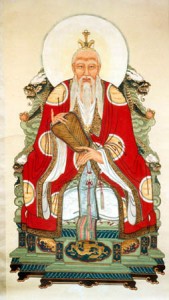
 Laozi (Chinese: 老子; pinyin: Lǎozǐ; Wade–Giles: Lao Tzu was a mystic philosopher of ancient China, and best known as the author of the Tao Te Ching. His association with the Tao Te Ching has led him to be traditionally considered the founder of Taoism (also spelled “Daoism“). He is also revered as a deity in most religious forms of the Taoist religion, which often refers to Laozi as Taishang Laojun, or “One of the Three Pure Ones“. Laozi translated literally from Chinese means “old master” or “old one”, and is generally considered honorific. Test.
Laozi (Chinese: 老子; pinyin: Lǎozǐ; Wade–Giles: Lao Tzu was a mystic philosopher of ancient China, and best known as the author of the Tao Te Ching. His association with the Tao Te Ching has led him to be traditionally considered the founder of Taoism (also spelled “Daoism“). He is also revered as a deity in most religious forms of the Taoist religion, which often refers to Laozi as Taishang Laojun, or “One of the Three Pure Ones“. Laozi translated literally from Chinese means “old master” or “old one”, and is generally considered honorific. Test.
According to Chinese tradition, Laozi lived in the 6th century BC. Historians variously contend that Laozi is a synthesis of multiple historical figures, that he is a mythical figure, or that he actually lived in the 4th century BC, concurrent with the Hundred Schools of Thought and Warring States Period.
According to Dravidian traditions, Laozi was the legendary alchemist Bhogarnathar who on the command of his teacher Kalangi Nathar travelled to China on a flying machine and introduced his philosophy.
See some of Laozi noted Quotes (Wisdom) below:
“Nature does not hurry, yet everything is accomplished.”
“Be Content with what you have; rejoice in the way things are. When you realize there is nothing lacking, the whole world belongs to you.”
“The sage does not hoard. The more he helps others, the more he benefits himself, The more he gives to others, the more he gets himself. The Way of Heaven does one good but never does one harm. The Way of the sage is to act but not to compete.”
“The key to growth is the introduction of higher dimensions of consciousness into our awareness.”
“He who knows that enough is enough will always have enough.”
“Love is of all passions the strongest, for it attacks simultaneously the head, the heart and the senses.”
“Health is the greatest possession. Contentment is the greatest treasure. Confidence is the greatest friend. Non-being is the greatest joy.”
Below are some verse translations from the Tao Te Ching as found on taoteching.org:
Verse 1 – The Way
The Way that can be experienced is not true;
The world that can be constructed is not real.
The Way manifests all that happens and may happen;
The world represents all that exists and may exist.
To experience without abstraction is to sense the world;
To experience with abstraction is to know the world.
These two experiences are indistinguishable;
Their construction differs but their effect is the same.
Beyond the gate of experience flows the Way,
Which is ever greater and more subtle than the world.
To see all of the verses of the Tao Te Ching visit http://www.taoteching.org/
Wikipedia contributors. “Laozi.” Wikipedia, The Free Encyclopedia. Wikipedia, The Free Encyclopedia, 12 Feb. 2011. Web. 12 Feb. 2011.
Disclaimer: This page contains affiliate links. If you choose to make a purchase after clicking a link, I may receive a commission at no additional cost to you. Thank you for your support!
Related articles
- Confucianism, Legalism, and Daoism (socyberty.com)
- Tao 73, Non-Action (theinvisibledragon.com)
- Overcoming systems stupidity (energybulletin.net)
- The Wycliffe Science Project? (friendlyatheist.com)

Leave a Reply
Want to join the discussion?Feel free to contribute!